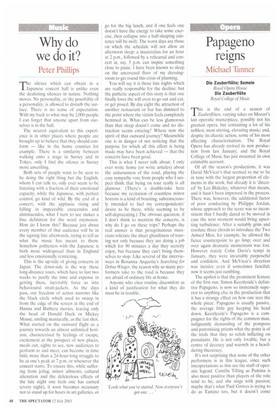Why do we do it?
Peter Phillips
The silence which can obtain in a Japanese concert hall is unlike even the deafening silences in nature. Nothing moves. No personality, or the possibility of a personality, is allowed to disturb the surface. There is no sense of expectation. With my back to what may be 2,000 people I can forget that anyone apart from ourselves is in the hail.
The nearest equivalent to this experience is in other places where people are brought up to believe that they should conform — like in the home counties for example. There is a similarity between walking onto a stage in Surrey and in Tokyo, only I find the silence in Surrey more unsettling.
Both sets of people want to be seen to be doing the right thing but the English, whom I can talk to, only ever seem to be listening with a fraction of their emotional capacity, while the Japanese, with perfect control, go kind of wild. By the end of a concert, with the applause rising and falling in impeccable crescendos and diminuendos, what I turn to see makes a fine definition for the word oxymoron. How do I know this? Because just about every member of that audience will be in the signing line afterwards, trying to tell us what the music has meant to them. Somehow politeness with the Japanese is both more widespread than in England and less emotionally restricting.
This is the up-side of giving concerts in Japan. The down-side is the way these long-distance tours, which have to last two weeks to justify the time and expense in getting there, inevitably force us into behavioural strait-jackets. As the days pass, our freedom of action narrows like the black circle which used to sweep in from the edge of the screen at the end of Hanna and Barbera movies, leaving only the head of Donald Duck or Mickey Mouse, smiling maniacally, as the last shot. What started on the outward flight as a journey towards an almost unlimited horizon, characterised by feelings of escape, excitement at the prospect of new places, meals out, sights to see, new audiences to perform to and meet, can become in time little more than a 24-hour-long struggle to be at one's peak at 7 p.m. or whenever the concert starts. To ensure this, while suffering from jetlag, minor ailments, cultural alienation and the deleterious effects of the late night one feels one has earned (every night), it soon becomes necessary not to stand up for hours in art galleries, or go for the big lunch, and if one feels one doesn't have the energy to take some exercise, then collapse into a half-sleeping existence will be swift. The worst days are those on which the schedule will not allow an afternoon sleep: a masterclass for an hour at 2 p.m., followed by a rehearsal and concert at. say, 5 p.m. can inspire something close to panic. I have been known to sleep on the uncovered floor of my dressingroom to get round this crisis of planning.
You will say it is those late nights which are really responsible for the decline; but the pathetic aspect of this story is that one finally loses the will even to go out and eat, or get pissed. By day eight the attraction of another restaurant or bar has dimmed to the point where the victim feels completely hemmed in. What can be less glamorous than that sleep doesn't come and no distraction seems enticing? Where now the spirit of that outward journey? Meanwhile one is in danger of not noticing that the purpose for which all this effort is being made may have been achieved — that the concerts have been good.
This is what I never talk about: I only ever write home (or write articles) about the arduousness of the road, playing the easy sympathy vote from people who I suspect think that being on tour really is all glamour. (There's a double-take here because my recitation of countless minor horrors is a kind of boasting, subconsciously intended to fuel my correspondents' desire to he there, while seeming to be self-deprecating.) The obvious question, if I don't think to mention the concerts, is why do I go on these trips? Perhaps the real answer is that peregrinations musicians tolerate the sheer ghastliness of touring not only because they are doing a job which for 90 minutes a day they secretly enjoy, but because they can't bring themselves to stop. Like several of the interviewees in Rosanna Arquette's Searching for Debra Winger, the reason why so many performers take to the road is because they are afraid of ordinary life at home.
Anyone who cites routine discomfort as a kind of justification for what they do must be in trouble.


































































 Previous page
Previous page